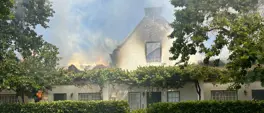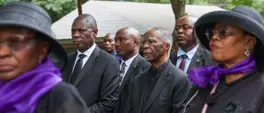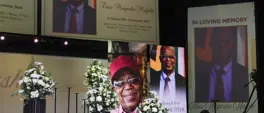Allegations that teacher job cuts favoured wealthy schools ‘categorically false’ – Western Cape Education Dept
Melikhaya Zagagana
23 January 2025 | 6:11The provincial education department says only special needs schools have been exempted from teacher cuts, but a researcher is disputing this, saying only poor areas lost contract teachers.
CAPE TOWN - The Western Cape Education Department (WCED) has dismissed claims that public schools located in wealthy suburbs of the province have been exempt from the recent contract teacher post cuts.
In August last year, provincial education MEC David Maynier announced that 2,407 teacher posts in public schools would be cut in January.
But researcher and education consultant Dr Seelan Naidoo says data analysis shows only schools from poor areas have lost contract teachers.
ALSO READ:
- WCED says only special-needs schools excluded from teaching contract post cuts
- Basic education committee 'extremely concerned' about impact budget cuts will have on school year
The Wced said it was disappointed in the allegations, and called Naidoo's findings political propaganda.
According to the provincial education department, only special needs schools have been exempted from teacher cuts.
But Naidoo said his analysis and findings were legitimate and could be investigated.
"There were 437 schools that did not appear on the Western Cape Education Department's list of which would have post cuts, which means of course they have been surreptitiously exempted from those cuts."
The department described the reports as an attack, and issued the following points in response to Dr Naidoo's claims:
1: How teaching posts are divided by national government The formula takes into account class sizes, the workload of teachers, the size of the school, language, curriculum, poverty, and other factors. Therefore, the claim that post reductions were made at schools based on quintiles is patently false. 2: Teacher allocations on quintile system The department alleges that Dr Naidoo’s own research document contradict his claim that Quintile 5 schools (schools that serve the least poor communities) were the least affected by teaching post reductions. According to education, he also indicates that the quintile with the highest number of schools with posts cut is Quintile 5. It says his reports show that the majority of schools with zero posts cut are Quintile 1, 2 and 3 (no-fee) schools, and that the quintile with the highest number of schools with zero posts cut is Quintile 1. Therefore, claims that Quintile 5 schools were the least affected are nonsensical and false, according to Dr Naidoo’s own document. 3: Transparency about schools affected by posts cut The department says members of Parliament request information from the department through questions to the provincial minister. Furthermore, it adds that information was provided last year via questions for written reply for the following: a) A list of the schools that had lost posts as a result of the reduction in the overall basket of posts. b) The number of posts affected at each school.
SADTU CONSIDERS INVESTIGATION
Meanwhile, the South African Democratic Teachers’ Union (SADTU) said it was mulling starting its own investigation into reports that some schools in wealthy areas were exempt from post cuts in the Western Cape.
SADTU said it had not seen anything sinister with the list of schools where teacher posts were not renewed.
The union however stated that it held a neutral view until it launched its own investigation.
SADTU provincial secretary Sibongile Kwazi said the same principle was applied across the board.
"Government use a certain formula that is applied uniformly in the system. So, we can't support or deny the allegations because we don't have any scientific evidence from our side to dispute that."
WCED spokesperson Kerry Mauchline confirmed only special needs schools were exempt from the cut of teachers.
"The claims made by the consultant are categorically false, and we encourage the public to ignore such propaganda.
The formula determining how the entitled number of teaching posts gets divided between schools, is provided by the national government, and takes into account class sizes, the workload of teachers, the size of the size, language, curriculum and other factors."
Naidoo has previously written an opinion piece criticising the department for its poor administration system for learner placements, which he said predominantly affected underprivileged families.
Get the whole picture 💡
Take a look at the topic timeline for all related articles.












